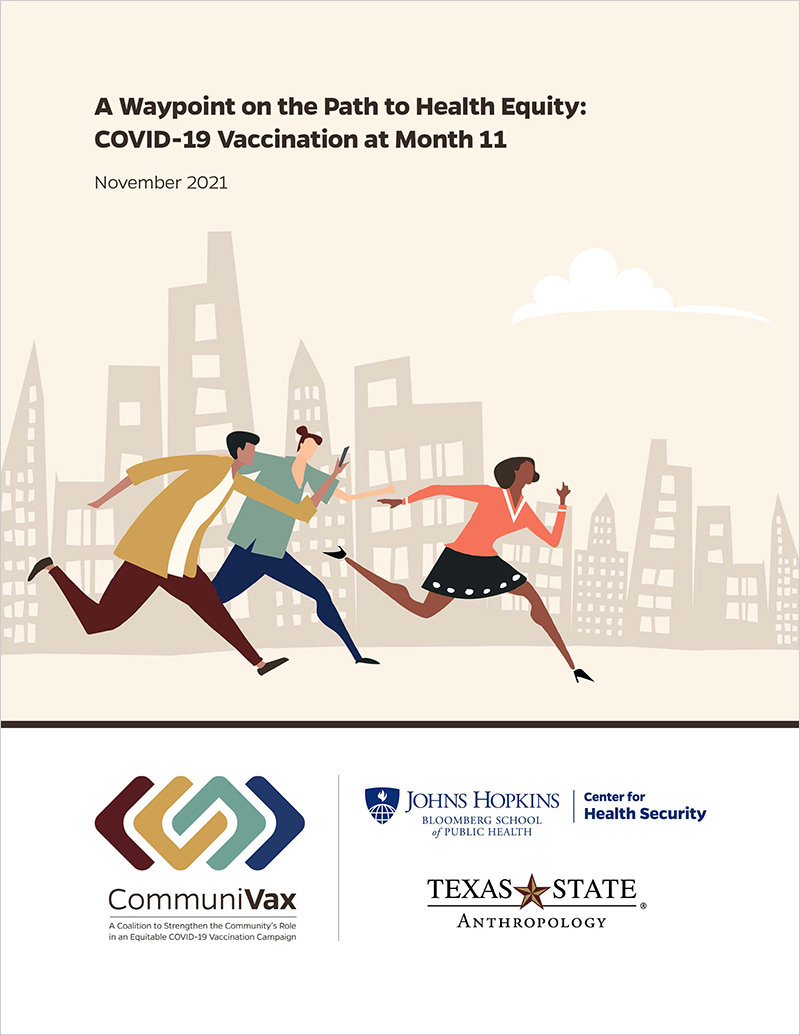New Report: Waypoint on the Path to Health Equity: COVID-19 Vaccination at Month 11
Center News

November 23, 2021 – The CommuniVax Coalition, led by the Johns Hopkins Center for Health Security at the Bloomberg School of Public Health and the Department of Anthropology at Texas State University, released a new report that recounts progress made toward greater equity in the COVID-19 vaccination campaign and proposes steps to advance gains further.
“As the U.S. response to the COVID-19 pandemic progresses through its second year, the ongoing need to identify and implement strategies for improving vaccine equity among BIPOC communities – especially amid historic disparities in healthcare access and utilization – remains,” write the authors of the report, Waypoint on the Path to Health Equity: COVID-19 Vaccination at Month 11. “This collective assessment could help to identify successes, failures, and lessons learned for future efforts around vaccine promotion and building health equity in BIPOC communities.”
The report identifies several key “wins” that have helped propel COVID-19 vaccination uptake amongst BIPOC communities, including:
- With substantial federal emergency funding available, public health departments have been able to hire community health workers and other high-impact assets to advance equity in vaccination.
- When decision makers have used grassroots input and hard data, service delivery has better matched BIPOC community needs in the pandemic.
- Delivering accurate, culturally competent, and language-appropriate information—in a nonjudgmental, ongoing conversation— has contributed to a more equitable COVID-9 vaccination campaign.
- Making COVID-19 vaccinations available alongside services for other needs such as food insecurity, unemployment, and immigration concerns has advanced equity in the pandemic response.
The report also offers several recommendations on how local, state, and federal government officials can sustain gains made as the COVID-19 response continues, among them including that:
- Creative, cross-cutting COVID-19 partnerships – borne of tragedy and powered by resolve – cannot be allowed to dissipate once the acute stage of the pandemic subsides and people begin to move on.
- Public financing structures should evolve to accommodate the administrative processes of community-based organizations and faith-based organizations, whose strengths are direct access to, trusted ties with, and deep knowledge of underserved groups.
- An equity-driven US public health system requires stable and sufficient funding, a workforce that mirrors the communities that it serves, and a governance model that elevates community needs and voices.
- Health equity requires a cross-cutting, multilevel strategy: meaning, policy improvements that solidify the community health system, strengthen the safety net, and remediate root causes.
Equity in COVID-19 vaccination coverage is still needed in many places throughout the country. Taking stock of early vaccine equity wins during the pandemic has shown that further integration of community mobilization strategies into the country’s public health infrastructure will produce both immediate and enduring returns in terms of better health outcomes, more community trust, and resilience to future health emergencies.
